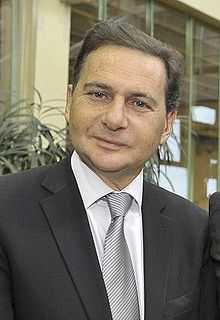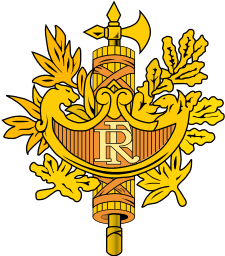Éric Besson
| Éric Besson | |
|---|---|
 | |
| Éric Besson, in 2010. | |
| Minister for Industry, Energy and Digital Economy | |
| In office 14 November 2010 – 10 May 2012 | |
| President | Nicolas Sarkozy |
| Prime Minister | François Fillon |
| Preceded by | Christian Estrosi |
| Succeeded by | Arnaud Montebourg |
| Minister of Immigration, Integration, National Identity and Mutually-Supportive Development | |
| In office January 2009 – 13 November 2010 | |
| President | Nicolas Sarkozy |
| Prime Minister | François Fillon |
| Preceded by | Brice Hortefeux |
| Succeeded by | Vacant |
| State Secretary for "Prospectives and Evaluation of Public Policies" | |
| In office May 2007 – January 2009 | |
| President | Nicolas Sarkozy |
| Prime Minister | François Fillon |
| Personal details | |
| Born | 2 April 1958 (age 53) Marrakech, Morocco |
| Nationality | French |
| Political party | The Progressives / UMP (since 2007) |
| Other political affiliations |
Socialist Party (1993–2007) |
| Spouse(s) | Sylvie Brunel (m. 1983–2009, divorced) Yamine Torjdman (m. 2010-present) |
| Children | 3 (with Sylvie Brunel) |
Éric Besson (born 2 April 1958 in Marrakech, Morocco) is a French politician of French-Lebanese descent. He was Minister of Industry, Energy and the Digital economy under the Minister of Economy, Finance and Industry, Christine Lagarde and previously, from 2009 to 2010, Minister of Immigration, Integration, National Identity and Mutually-Supportive Development in the government of François Fillon.
He left the Socialist Party (PS) the day of the first round presidential elections in 2007 to found The Progressives, a social democratic affiliate party of Nicolas Sarkozy's Union for a Popular Movement (UMP). He has been Deputy Secretary-General of the UMP since 2009.
Biography
Eric Besson was born in Morocco. His mother is from Lebanon and his father, a flight instructor in the French Air Force, was killed in a flight accident three months before Éric's birth. At 17, he settled with his family at Montélimar, France and studied at École supérieure de commerce in Montpellier, then in the Institut d'études politiques de Paris. Besson joined the French car company, Renault, then worked for Challenges, a business monthly, before joining the Vivendi foundation.
Besson was married from 1983–2009 to Sylvie Brunel, a geographer and writer, former president of Action Against Hunger and they have three children. Their eldest child, Alexandra (born 1989), is a novelist.
Besson has been married since September 2010 to Yasmine Tordjman, a 24-year old art student from Tunisia.[1] Tordjman belongs to a prominent Muslim family of Turkish origin[2] with connections to former Tunisian president Habib Bourguiba.[3] In December 2012, two years after the marriage, Yasmine Tordjman Besson announced her intention to divorce. The former minister has confirmed the news.
In 2013, the Besson couple ended the divorce proceedings and resumed their relationship.
Political career
Besson was a member of the Socialist Party from 1993 to 2007. He has been mayor of Donzère since 1995 and was the député for the Drôme between 1997 to 2007 (he did not stand for re-election in 2007). Besson began the 2007 French presidential election as a member of Ségolène Royal's campaign team. In January 2007, 4 months before the presidential elections, Besson coordinated the publication by the socialist party of a 106 pages book titled « The worrisome quiet rupture of Monsieur Sarkozy ». The book in itself is an attack against Nicolas Sarkozy and his “mediocre” achievements as a member of the government. Sarkozy is painted as “a US neocon with a French passport”.[4] According to Eric Besson, Nicolas Sarkozy is “a kind of French subsidiary of Bush, Inc.” However, on 21 February, Besson defected the Socialist party in a blaze of publicity, proclaiming that he felt the Socialist campaign's economic policy to be deeply flawed. On 22 April, he joined Sarkozy at a political rally. He then joined Nicolas Sarkozy's first government. He has been labeled "the traitor" ever since by part of the media and the public.
In May 2007 he served as State Secretary for Prospectives and Evaluation of Public Policies. That year, he launched a new political party, The Progressives, affiliated with the Union for a Popular Movement, Nicolas Sarkozy's party through the Liaison Committee for the Presidential Majority. In January 2009, he was appointed Minister for Immigration, Integration, National Identity and Mutually-Supportive Development in the government of Prime Minister François Fillon
As successor to Brice Hortefeux in charge of immigration and national identity he announced the objective of ensuring 29,000 compulsory repatriations per annum. He said that legislation enacted penalizing assistance to illegal immigrants (with up to 5 years imprisonment) was not intended to discourage the general public but only traffickers. Éric Besson has endeavoured to overturn the role of Cimade in offering assistance to illegal immigrants held in the expanded network of detention centres in France by opening bids for offer of these services by other agencies. In September 2009, Besson effected the clearing of an area known as "the Jungle" near Calais, where cabins and shacks housed mainly illegal immigrants desiring to settle in Great Britain and primarily of Afghan or Kurdish stock.
In 2009, Besson zealously led the "debate on national identity" initiated by President Nicolas Sarkozy of France as a means to win the far right's votes. But three months on, in February 2009, the debate was dropped amid confusion and controversy and Besson's image was further harmed. One weekly magazine named him "the most hated man" in the Republic.[5]
In 2010, Besson sent a letter to a state agency asking them to examine how to avoid a French company (OVH in this case, a French Internet hosting company) from hosting wikileaks web site.[6]
In April 2011, the Union for a Popular Movement selected him as its candidate in the newly created Fifth constituency for French residents overseas (covering French citizens resident in Andorra, Monaco, Portugal and Spain) for the June 2012 legislative elections.[7]
Offices
- Governmental functions
- Minister for Industry, Energy and Digital Economy : 2010-2012.
- Minister of Immigration, Integration, National Identity and Mutually-Supportive Development: 2009–2010.
- Secretary of State in charge of exploration, appraisal of public policies and development of the digital economy : 2007–2009.
- Electoral mandates
- National Assembly of France
- Member of the National Assembly of France for Drôme (2nd constituency) : 1997–2007 (Became minister in 2007). Elected in 1997, reelected in 2002.
- Municipal Council
References
- ↑ "Eric Besson- Yasmine Tordjman- Mariage prévu en septembre". Pipole.net. 18 July 2010. Retrieved 28 July 2010.
- ↑ Hurriyet. "Umarım yakında bütün Arap kadınları Tunuslularla aynı haklara sahip olur". Retrieved 2013-03-24.
- ↑ Allen, Peter (10 February 2010). "French burka ban minister denies planning to convert to marry secret Muslim lover". Daily Mail. Retrieved 28 July 2010.
- ↑ "L'hebdo des socialistes " Blog Archive " L’inquiétante " rupture tranquille " de Monsieur Sarkozy". Hebdo.parti-socialiste.fr. 2007-05-20. Retrieved 2011-11-28.
- ↑ "Abonnement magazine Marianne, Numéro 660, Eric Besson, l'homme le plus détesté de France". Relay.com. Retrieved 2011-11-28.
- ↑ (French) http://www.lepost.fr/medias/www/1.0.415/pdf/besson.wikileaks.lepost.fr.pdf
- ↑ "Législatives : l'UMP a désigné ses candidats pour l'étranger", Le Figaro, April 13, 2011
External links
- (French) Éric Besson's web site
- (French) Biography
| ||||||||
|
